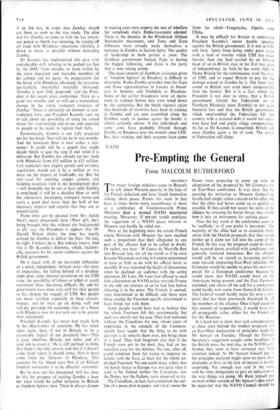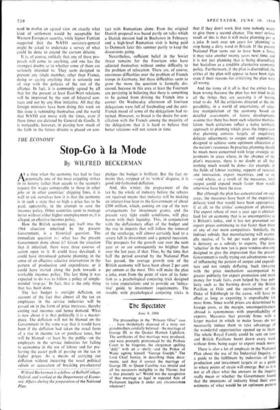NA TO
Pre-Empting the General
From MALCOLM R UTHER FOR D
BRUSSELS
IHE major foreign ministers came to Brussels to talk about Western security in the face of the French defection and have found themselves talking about peace. Events this week in fact have at times borne more resemblance to those at a conference of Commonwealth Prime Ministers than a normal NATO ministerial meeting. Moreover, if present trends continue, the suggestion of a NATO peace mission to Moscow can hardly be ruled out.
Here at the beginning were the errant French whose flirtation with Moscow has now reached such a proportion that their allegiance to any part of the alliance had to be called in doubt. Or rather, not here: M Couve de Murville-flew into Brussels late, for all the world as if he were Kwame Nkrumah arriving in London determined to have as little to do with his official hosts as possible. It was reckoned the height of discourtesy when he declined an audience with the acting chairman, Dr Luns. Dr Luns had offered to read him a document on NATO policy towards France in the odd ten minutes or so he had free before releasing it to the press. The French, it seemed, were determined to be difficult and there were those among the Fourteen equally determined to have things out with them.
Some people would have had us believe that the whole Fourteen felt this unanimously, but such was clearly not the case. They had reckoned without the Canadians for one, whom years of experience in the councils of the Common- wealth have taught that the thing to do with quarrels is to smooth them over, not bring them to a head. They had forgotten also that if the French were put in the dock they had an im- maculate case for the defence. No one, after all, could condemn them for trying to improve re- lations with the East, at least not the whole un- divided Fourteen. No one could either, that the Soviet threat to Europe was not quite what it used to 'be. Indeed neither the Canadians, nor the Danes, nor the Italians, were prepared to try.
The Canadians, in fact, had committed the out- line of a peace plan to paper, and what's more the Danes were preparing to come up with an adaptation of the proposal by Mr Gromyko for an East-West conference. It was clear that by securing his invitation to Moscow General de Gaulle had simply stolen a march on his allies and that the allies had better catch up as quickly as possible. If they could not secure the unity of the alliance by stressing the Soviet threat, they would turn it into an instrument for seeking peace.
Thus the key word at the conference came to be 'outflank,' or if you prefer it 'pre-empt.' The majority of the allies had so to associate them- selves with the Danish proposals that they would neither go it alone nor fall into the camp of the French. In this way the proposal could be modi- fied, watered down, overlaid with conditions, and generally rendered innocuous. But the alliance would still be on record as favouring positive steps towards improving East-West relations. Mr Gromyko would be unable to press his own pro- posals for a European conference because he would know that NATO would insist on the Americans being present and the East Germans excluded, and above all the call for a conference could hardly now come from General de Gaulle. The General would hardly make his own a pro- posal that has been previously discussed by all the members of the alliance. Once it had acquired this amount of respectability, it would have lost all propaganda value, either for the French or for the Russians.
It is hard not to think that such considerations as these were behind the modest proposals for an East-West declaration of principles made by Mr Stewart on Tuesday. Though the Foreign Secretary's suggestion caught some headlines in the British press the next day, in the NATO con- ference they seem to have attracted very little attention indeed. As Mr Stewart himself put it, the principles declared might seem no more than platitudes at first, so the lack of interest is hardly surprising. Yet enough was said in the same vein by other delegations to give an indication of the way things are going. Mr Rusk himself put an even milder version of Mr Stewart's idea when he suggested that the NATO Cduncil should be
used to evolve an agreed view on exactly what kind of settlement would be acceptable for Western European security, while Signor Fanfani suggested that the NATO secretary-general might be asked to undertake a survey of what could be done to extend the current détente.
It is, of course, unlikely that any of these pro- posals will come to anything, and one has the strongest doubts as to whether some of them are seriously intended to. They seem designed to prevent any single member, other than France, doing or saying anything that is seriously out of step with the policies of the rest of the alliance. In fact, it is commonly agreed by all that for the present at least East-West -relations will be improved by the sum of bilateral con- tacts and not by any bloc initiative. All that the foreign ministers have been doing this week on this issue is reminding themselves and the world that NATO can move with the times, even if these times are dictated by General de Gaulle. It is noticeable, however, in passing how much of the faith in the future détente is placed on con- tact with Rumanians alone. Even the original Danish proposal was based partly on talks which a Danish mission had in Bucharest in February and a high-level Rumanian visit is being paid to Denmark later this summer partly to keep the discussions going.
Nevertheless, sufficient belief in the Soviet threat remains for the Fourteen who have adjusted themselves without undue difficulty to the problem of relocation. There are, of course, enormous difficulties over the problem of French troops in Germany, but these difficulties seem to grow the more the question is formally dis-. cussed, because in this area at least the Fourteen are persisting in believing that there is something to be gained from driving the French into a corner. On Wednesday afternoon all fourteen delegations were full of foreboding and the anti- French mood of some of the delegations had re- turned. However, so broad is the desire for con- ciliation with the French among the majority of the delegations that it is hard to believe that better relations will not return in time.



































 Previous page
Previous page